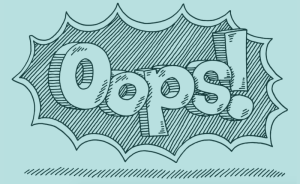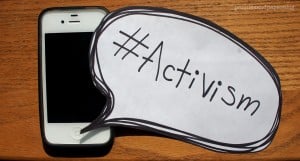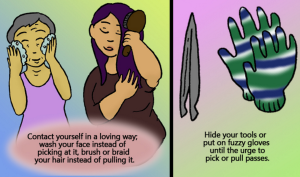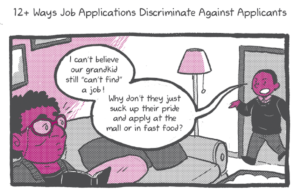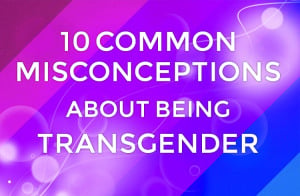
Source: WikiHow
Part of my job as a Managing Editor here at Everyday Feminism is to field the e-mails that come flooding into our inbox.
As harrowing as this can sometimes be – as you can imagine – it’s also an incredibly useful tool to get a feel for what our readers are struggling with so that we can prioritize writing articles that address those needs.
This is one of those articles.
I recently read an e-mail that opened: “In my experience, having an eating disorder while identifying as a feminist has made me feel like a hypocrite. It’s confusing and difficult to encourage body-positivity in others when I don’t do the same for myself.”
And I threw my hands up in (unfortunate) solidarity. Because ain’t that the truth.
Eating disorders take a lot away from us.
They take away our sense of control, our cognitive ability, our autonomy, our warmth, and our loved ones – to name a few.
But they don’t have to take away our feminism.
Though a lot of us struggle with this, it is possible to hold both identities – person with an eating disorder and feminist – at the same time.
You might ask yourself how the hell you can be a righteous, authentic feminist, waving the flag for body-positivity, when sometimes you can’t even get out of bed because you hate your body so much.
Well, here’s how:
1. Remember: This Is About Mental Health
Let’s start here: Your eating disorder is not about socially constructed values and norms around beauty ideals — which is what feminists are fighting against — although that’s a part of it.
Eating disorders are biopsychosocial in nature, which means that there are biological, psychological, and sociological factors at play that make a person susceptible to, and triggered into, eating disordered thoughts and behaviors.
Eating disorders are seriously complex. But at its root, your eating disorder is a mental health issue.
That is, despite the ridiculous claims by certain celebrities that eating disorders (and especially anorexia nervosa) are characterized by willpower and self-control, the exact opposite is actually true: An eating disorder is, quite literally, the experience of certain neurobiological components being completely out of control.
Your brain chemistry is fucked up.
How else could one reasonably explain a person’s “persistent restriction of energy intake” (like self-starvation) or “recurrent inappropriate compensatory behaviors” (like self-induced vomiting)?
Our brains are hardwired to completely avoid eating disordered behavior.
This isn’t your average Bad-Body-Image-Day-After-Watching-The-Victoria’s-Secret-Fashion-Show that we’re talking about.
We’re talking about a literal psychological and mental disturbance – and that’s not so easily solved.
The body-positivity movement (and feminism overall) works toward improving media representation of diverse bodies, deconstructing bullshit diet culture, and promoting the revolutionary act of self-love. And all of this can influence (and hopefully reduce) the experience of eating disorders.
But, just like feminism can’t stop you from experiencing any other health issue, it can’t stop you from developing an eating disorder either.
2. Also Remember: Feminism Is Not About Perfection
Your eating disorder may give you a perfectionist complex, but your feminism shouldn’t.
Seriously. Just ask Roxane Gay.
There are a lot of debates in the feminist sphere about what makes someone a “good” feminist: Is it Miley Cyrus or Beyoncé? (Hint: It’s Beyoncé.) Is it voting for anti-oppression legislation or boycotting the legislative system altogether? IS IT SHAVING OR NOT SHAVING?
But one theme is becoming abundantly clear to us: There are a lot of ways to do feminism, and none of them are necessarily right or wrong (except a lack of intersectionality – that’s definitely wrong).
No one expects perfection from you.
Rather, in feminism, we want you to understand that perfection does not exist. None of us are doing it right 100% of the time – none of us. And while we need to welcome being held accountable when we mess up, the pursuit of a Feminist Perfection is fruitless.
There are certain thought patterns or behaviors that you may engage in that feminists are going to tell you are fucked up. It’s not okay to exclude women of color or trans women from spaces and dialogue. It’s not cool to use ableist or heteronormative language. You can’t vilify the poor or working class. Sometimes we don’t like it when you say “I’m not a feminist, but…”
But notice how binge eating isn’t on that list. Neither is purging or restricting or compulsively exercising or experiencing body dysmorphia.
No one should expect you to come to a feminist space having had it all figured out. If anything, we should expect that you’re coming to feminism to figure it out.
It’s okay if you still harbor your own struggles. We all do.
3. Create the Change You Need
The brilliant Ayesha A. Siddiqi once tweeted, “Be the person you needed when you were younger,” and this concept is exactly why I do the work that I do.
I came to feminism and body-positivity after being diagnosed with an eating disorder. Both movements provided me with an operational framework that supported and informed my journey toward understanding my own history, which has been powerful. But I’ve also come to accept that while this can affect my future, it can’t change my past.
What’s happened to me has already happened to me. I can’t erase my eating disorder.
But as I work toward my own healing, what I can also work toward is a more just society in which, among other things, people (and women especially) aren’t valued for their bodies above all else and where mental health is taken as seriously as physiological health.
You can help set the foundation for building a culture where prevention and intervention efforts are effective in reducing the harm done by eating disorders.
You can use your feminism in a way that actually builds off of your eating disordered experience. You can use those intersecting identities to improve your activism.
This isn’t a zero-sum game. And you can do this in a few ways.
4. Take Your Feminist Space and Make It ED-Informed
You know how we’re always telling male allies that their role isn’t to come into a leadership position within feminism, but rather to take the spaces they already occupy and make them feminist?
You can do the same thing.
You’re in a unique position to educate fellow feminists on an issue that they may only understand in theory!
Make sure that you’re calling in your fellow feminists when they comment that Barbie dolls are problematic because they “look anorexic” – like my colleague Anne Thériault recently did.
Write in to your favorite social justice blogs when they’re not doing a good enough job with eating disorder trigger warnings. Remind your feminist friends that fatphobia is real and pervasive and needs to be a part of anti-oppression dialogue.
You’re an insider, and people will listen to you.
5. Preach What You Can Practice
A lot of the feeling of hypocrisy seems to come from the notion that it’s hard to practice what you preach when what you’re preaching is body-love and what you’re feeling is body-hate.
But one of the biggest problems with the body-positive movement overall is its fixation on talking at people about how they should feel without giving them the tools to help them do that.
It doesn’t need to be like that.
Instead, think about the practices that you are able to partake in. You don’t need to scream “LOVE YOUR BODY” at the top of your lungs when you don’t always love yours. Instead, your message can be “Hold yourself in compassion” or “Forgive yourself.”
Maybe, eventual full-on body-love is the ultimate goal, but there are stops along the way – and no one ever seems to want to talk about those. But you can.
6. Speak Your Truth and Shatter Myths
One of the basic tenets of what we believe here at Everyday Feminism is that your truth matters and that your story needs to be told.
For people who are marginalized – especially in intersecting ways – this goes for you tenfold!
The fact that eating disorders don’t discriminate is so unknown that even 2015’s National Eating Disorders Awareness Week is focusing a day on how people from disenfranchised groups are affected.
So few stories exist out there on major platforms about people who aren’t thin, middle- to upper-class, straight, white, cis women who experience eating disorders. So your grassroots efforts go a long way!
Start your own blog to detail your experience or submit your story to blogs and projects that have already been organized and launched. Donate time, energy, and/or money to kick-ass organizations like Trans Folx Fighting Eating Disorders and Nalgona Positivity Pride.
If you fall into the aforementioned group that represents the dominant paradigm in eating disorder narratives, do everything in your power to center marginalized groups in your praxis (like, for instance, by reblogging inspirational pictures on Tumblr that feature more than just white women).
There is nothing more feminist than owning your truth and sharing it. That’s how lives are changed.
***
It’s awesome that people are coming to the awareness that feminism is something that you do, not just a belief that you hold.
But if you’re feeling guilt, shame, or failure around your relationship with feminism, there might be some restructuring in your heart to be done.
People with eating disorders can exist and thrive in feminist spaces – in fact, I (and so many others) need you to. And you can do so in a way that holds your experience as an asset, rather than a setback.
[do_widget id=”text-101″]
Melissa A. Fabello, Co-Managing Editor of Everyday Feminism, is a sexuality educator, eating disorder and body image activist, and media literacy vlogger based out of Philadelphia. She enjoys rainy days, Jurassic Park, and the occasional Taylor Swift song and can be found on YouTube and Tumblr. She holds a B.S. in English Education from Boston University and an M.Ed. in Human Sexuality from Widener University. She is currently working on her PhD. She can be reached on Twitter @fyeahmfabello. Read her articles here and book her for speaking engagements here.
Search our 3000+ articles!
Read our articles about:
Our online racial justice training
Used by hundreds of universities, non-profits, and businesses.
Click to learn more







